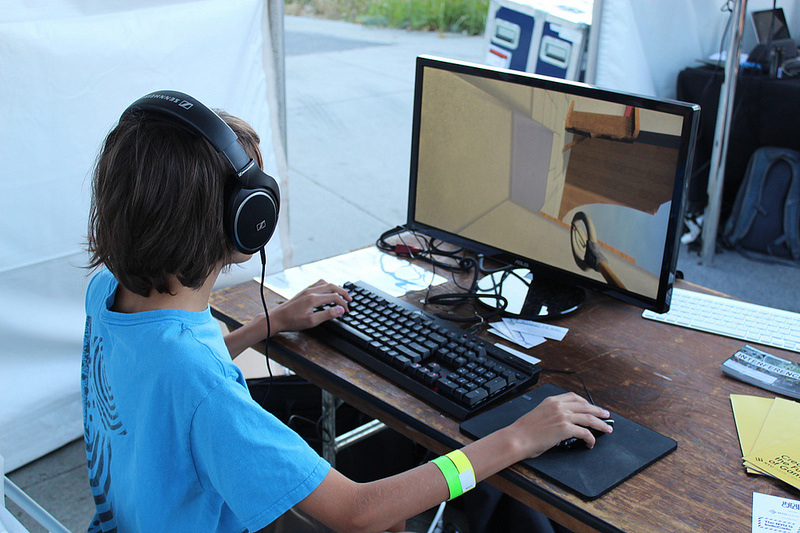- The younger the child, the more likely their brains will be "trained" to be rewarded by and possibly addicted to video games. The younger the brain, the more "plastic" it is which means that it is hard-wired by nature to adjust to the environment to ensure its survival. If you give this brain video game time, it will adapt to it. Just sayin'...
- The reward centers of the brain (including the amygdala which is the "seat of emotions") are so powerful that rats are known to die from starvation and exhaustion from pressing levers for the "reward" without pressing the levers for food! Oh yeah...death by stimulation.
- The prefrontal cortex (behind the forehead) of the brain function as regulators of behavior and this area does not mature until the early 20s or mid-30s, so they don't know how to walk away from video games or stop many behaviors until there is a painful consequence. (Doesn't that just explain a lot of your experience with them?)
- The visual system is our strongest sense and Hollywood and now, the video game industry has tapped into that strength to bewitch us into playing along. Unlike going to the movies or just sitting and watching one, video games go on and on and on and people have actually died from sitting too long and playing these games!

Oh yeah, there are those that say that video games develop skills. Well, that might be true if you are a fighter pilot, an astronaut, or soldier training for combat, but that's about it. There can be minimal gain with hand-eye coordination, but greater gains are seen in ball and ball/racket skills, so get out there in great outdoors if you really want to improve this skill set.
Let's talk about what actually happens in the brain during fast-paced video game playing. (I've seen this information in more than one publication!):
- One part of the brain involved in risk and reward processing (left striatum) has greater volume. This increase is also seen in those who engage fairly consistently in gambling. It is known that people will take greater risk to avoid a loss than they will to achieve a gain which may account for the incessant game playing (uh oh...can you say, "Addiction in process"?).
- You know that violence-aggression dynamic I just talked about? Well, it is so powerful that behavioral changes secondary to brain changes can happen in as little as a week, so watch your kids. Even when kids stop playing, residual aggression remains. These games impact the cingulate cortex which has a strong role in aggressive behavior and in regulating emotions.
The obvious problems, obesity, irregular sleep pattern, social and behavioral problems not to mention the academic issues and conflict with parents, are part of the "misery index" of computer games.
Of course, it is likely the case that video games precipitate behaviors that are underlying the behavior, but remember that practice helps you to "get good at something", so if you are engaged in a combat-type game, WHAT, exactly, is your kid learning?
Your approach depends on the age of your child and how much they already use "screens" of all kinds including television, DS players, XBox, iPads, iPhones, video games, laptops, on and on and on.
You probably have little idea how much time your kid actually spends in front of screens. For the next two days, just make a mental note of how much time they are spending plugged into these devices. The parents in my practice and just gob-smacked (OK, this is an homage to my Brit friends!) when they realized just how well they have been trained to "normalize" the amount of time their kids are on screens! Get the data so you can share it with your kids when you implement the new "screen plan".
If your child is younger, it's easier to distract them with activities because you, Mom and Dad, can be the distraction. They are still very social and enjoy being with you, so if you ask them to play a game, they are likely to come along. Still, the little ones should not be in front of screens for more than 2 hours daily. Children under 2 years should not be involved in any screen time. NONE!
If your child is elementary age and older, learn to negotiate. If they are currently in front of screens for 5 hours a day, you have to back this down by 30 minute increments week-by-week until it is 2 hours. You know what happens when people "withdraw" from anything on a "cold turkey" basis! It's a disaster and since your kids lack reasoning skills, you are likely to lose. Consider "trading off". For example, if they play outside for an hour, they can have 20 minutes screen time. They can earn more time with increased effort and improved attitude toward homework, improved interactions with you (increased cooperation, kinder to siblings, helping siblings with homework, etc). They need to know if they make it easier for you to help them get what they want, it's a win all over the place. It's a fabulous "carrot" to dangle in front of them. Later, it will be the car keys, but please, one step at a time.
Now, when your kid gets into middle school, it's going to be more difficult, especially with boys, so get ready. Remember, don't get emotionally involved! Approach them with a RATIONAL, REASONABLE PLAN! Don't get hysterical. You'll lose your credibility. Use words about being healthy and helpful. Avoid "good", "bad", etc. Of course, they'll beg and plead and tell you all the things that their friends are allowed to do. Steel yourself, you've got years of this ahead of you. Standard answer? "In the Smith family, we do it this way." That's your mantra. Sooner or later, they'll stop whining and moaning because you're a brick. They know you mean business. Protect them from themselves just like you do with their health.
Here are some basics. Post them on a large piece of paper in a public place so they can be reminded of them daily until everyone "owns the rules". Remember, if you slip up once, you've reinforced that you are a push-over and you have to start over...stay strong!
- No screens at dinner for all diners (that's you, too, Mom and Dad!)
- No screens on during your homework time.
- No more than 2 hours daily of all kinds of media consumption.
- Strictly adhere to the recommended age for use. There's a reason for this. Fantasy and reality are difficult for some ages to distinguish between.
- No televisions or computers in the bedrooms.
- Use parental controls!!!
- Remove games from computers that are used for school work.
- Facebook, Instagram and other social media cannot be accessed until you are _____ years old.
- Video games are to be played in a common area. That's it. Period. You want to play it, you've gotta do it within the family setting.
All kinds of video games are addicting, including the educational games. The fast pace of the action, the colorful presentation and the sounds are very appealing to the brain and the mind. So, caution. Provide other things for them to do. Family puzzles that are out on the table for somebody to add to every now and then, a basketball hoop up on the patio, etc.
Be brave, stand your ground, make a deal, keep their futures in mind and be a smart parent. People spend nearly $21,000,000,000 on video games annually. That's a powerful force to move against. You'd better be strong because those folks don't care about your kids, they just want the cash.
TTFN, Claudia
Join me on Facebook at Dr. Claudia McCulloch
At drclaudia.net, click on the "Ask Me" button and submit a question.




